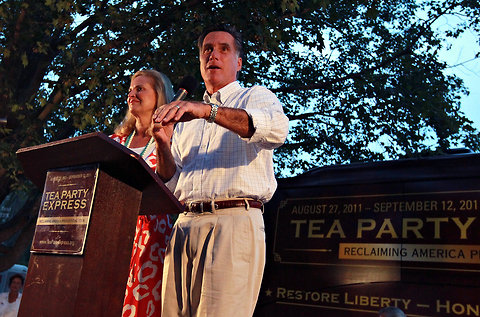Romney Won't Drink the Tea

In an October 11 post discussing Romney’s performance in a recent Gallup poll, the Washington Monthly’s Steve Benen noted, “What seems more interesting, however, is just how weak a frontrunner Mitt Romney really is. Even as Rick Perry’s support collapses, and even when the rest of the GOP field is largely ridiculous, the former Massachusetts governor is still stuck with 20% — down a few points from a month earlier.
He’s reclaimed the lead, but he backed into it. As the Gallup report noted, in nearly every instance since 1959, by this point in the race, the Republican frontrunner enjoyed support of at least 41% before going on to win the party’s nomination. Romney hasn’t even been able to reach 30% in any Gallup poll this year.”
Despite the controversy over Dr. Robert Jeffress’ remarks about Romney’s faith—remarks that call to mind Mike Huckabee’s pathetic potshots regarding Romney’s religion in 2007—it’s too facile to declare anti-Mormon sentiment the sole source of Romney’s woes. Romney’s reassessment of culture-war issues also fails to explain his lack of strong popularity among the Republican Party’s core voters.
Why is it that the GOP base seems not to care a whit about Mitt? Perhaps it’s because he is the anti-Tea Party, anti-talk-radio, anti-anti-government candidate.
Romney will never be able to appeal to those who want “limited government.” He fundamentally cannot; he is, at bottom, a center-right candidate who believes that government, when run effectively and efficiently, can produce the best results for the most people. It’s a noble view—one that the GOP base seemingly hates him for.
Anti-Romney sentiment is clearly connected to the idea that if Romney wins, the Reagan Revolution somehow loses. A Romney presidency could actually restore the average American’s faith in the competency of Washington—a notion that GOP base voters find intolerable.
Conservatives and Tea Partiers were supposed to put an end to people like Romney. They had convinced themselves that the era of the Bush 41-style Republican was over and done with, and that the GOP would now and forever be controlled by the purebred conservatives, the ideological offspring of Reagan and Goldwater, the true believers who would finally cut Washington down to size and starve the statist beast until you could see its ribcage.
If Romney becomes the GOP nominee, it will prove that the Tea Party project was an abject failure, and that the momentum of 2010 was only temporary.
Romney doesn’t represent “taking the country back.” To the contrary, he represents taking the country forward, and recognizing government’s appropriate role in doing so.
Though he argues that Obama’s handling of the government has been problematic, he does not believe that government is the problem.
Remember when Romney withdrew from the presidential race in February 2008? He noted at the time, “I hate to lose!” The same goes for the GOP base—and in Romney, they see ideological defeat. The more rational members of the GOP base know that Romney stands the best chance of defeating Obama, but they also know that a Romney presidency will not roll back the size and scope of government.
The anti-Romney right dislikes the man because he represents reality—the reality that “Big Washington” will always be with us, the reality that our only hope lies in having competent, intelligent people in charge of “Big Washington.” “Romney’s personable, pragmatic brand of politics may not appeal to combative conservatives,” the Boston Globe’s Scot Lehigh wrote in an October 7 column. “Yet that same style gives him real reach with moderates and centrists. And the middle, after all, is where elections are won.”
For those combative conservatives, Lehigh’s words—and the reality they reflect—are as painful as a scalding cup of tea.

